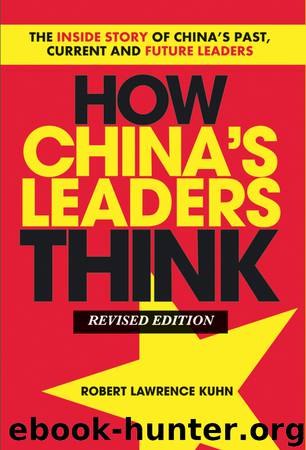How China's Leaders Think by Robert Lawrence Kuhn

Author:Robert Lawrence Kuhn
Language: eng
Format: epub
Publisher: Wiley
Published: 2011-05-12T16:00:00+00:00
Chapter 23
Banking Reform: The Largest Assets and Greatest Risks
In the late 1990s experts feared that the Chinese banking system, burdened by incalculable amounts of bad debt, could cause the collapse of China’s entire economy. The fear was expressed not only by China’s foreign critics, but by domestic officials and economists too.
In 2008, of the world’s top five banks by stock market capitalization, three were Chinese. The world’s number one valued bank was the Industrial and Commercial Bank of China (ICBC); its value peak of more than $300 billion was 40% higher than any other bank. How did this happen?
Historically, Chinese banks were more funding agents of government subsidy than prudent lenders of commercial credit. They functioned as cash-transferring funnels, into which the state treasury poured money in order to prop up inefficient state-owned enterprises (SOEs), which lost money constantly but provided employment. In a planned economy this actually made sense, but with the transition to a market economy, it had become a severe liability.
Change began when the government removed the bad loans from major banks’ balance sheets, put them into special-purpose companies (which would hold and sell off these bad loans), and recapitalized the major banks with tens of billions of dollars of fresh capital. The government also brought in foreign financial institutions as minority investors, to help change the banks’ management style and create a credit culture. This transformation, while still on-going, has been a great success. Banks are now broadly accountable to commercial economics not government orders.
Liu Mingkang, chairman of the China Banking Regulatory Commission (CBRC), which is responsible for overseeing all banking institutions in China, told me his personal story of banking reform.1
Liu Mingkang, chairman of China Banking Regulatory Commission (Beijing, April 2008).
Download
This site does not store any files on its server. We only index and link to content provided by other sites. Please contact the content providers to delete copyright contents if any and email us, we'll remove relevant links or contents immediately.
International Integration of the Brazilian Economy by Elias C. Grivoyannis(111059)
The Radium Girls by Kate Moore(12028)
Turbulence by E. J. Noyes(8050)
Nudge - Improving Decisions about Health, Wealth, and Happiness by Thaler Sunstein(7707)
The Black Swan by Nassim Nicholas Taleb(7129)
Rich Dad Poor Dad by Robert T. Kiyosaki(6633)
Pioneering Portfolio Management by David F. Swensen(6301)
Man-made Catastrophes and Risk Information Concealment by Dmitry Chernov & Didier Sornette(6019)
Zero to One by Peter Thiel(5802)
Secrecy World by Jake Bernstein(4753)
Millionaire: The Philanderer, Gambler, and Duelist Who Invented Modern Finance by Janet Gleeson(4478)
The Age of Surveillance Capitalism by Shoshana Zuboff(4293)
Skin in the Game by Nassim Nicholas Taleb(4250)
The Money Culture by Michael Lewis(4207)
Bullshit Jobs by David Graeber(4190)
Skin in the Game: Hidden Asymmetries in Daily Life by Nassim Nicholas Taleb(4007)
The Dhandho Investor by Mohnish Pabrai(3765)
The Wisdom of Finance by Mihir Desai(3748)
Blockchain Basics by Daniel Drescher(3583)
